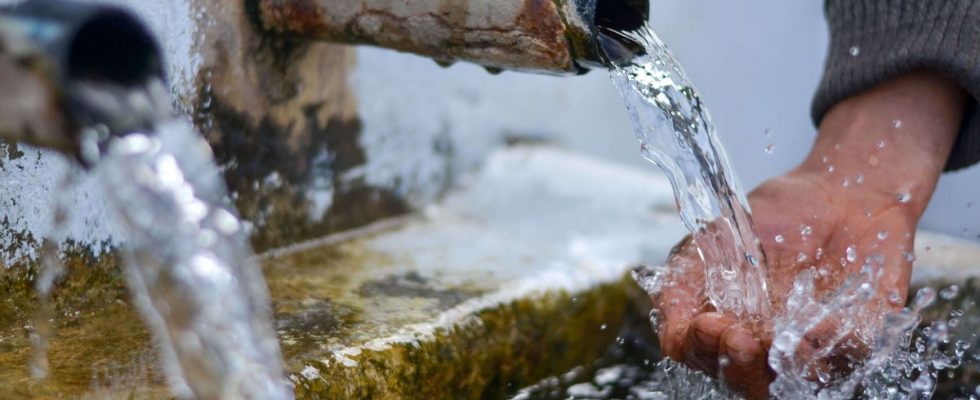The “worse has been avoided”, according to a ministerial report on water management during the 2022 drought. For those who lived in a cellar last year (and they would have been right), France* experienced the most severe drought for at least half a century, combining record heat waves and absence of rain over most of the territory. Result: the running water that seems so banal to us has stopped flowing from the taps of many French homes. “More than a thousand municipalities had to put in place, during the summer of 2022, exceptional management measures to supply their inhabitants. Among them, 343 had to transport water by truck, and 196 distribute water bottles, no longer being able to supply water at the tap”, recalls the report published last March. Is there a risk of running out of water in the years to come? Will we soon die of thirst?
To die of thirst, perhaps not, but to experience repeated crisis situations, certainly. We will have to get used to these “extraordinary” events as the consequences of climate change are growing. This winter, France went through an unprecedented winter drought with more than thirty days without precipitation. The March rains were not enough to recharge groundwater in France, 75% of which remain at moderately low or very low levels, the Bureau of Geological and Mining Research (BRGM) announced in mid-April. Needless to recall the importance of rain to have water. The rain in winter makes it possible to renew the natural stocks, in particular the water tables, to humidify the grounds, to allow a good growth of the vegetation in the spring.
“We imagined that water was unlimited”
Speaking of the future, the Future Information Report of water unveiled in the Senate on April 11 envisages a disaster scenario. “That of a significant drop in the availability of water in many regions, with a general drop in the level of the water tables and a reduction in the possibilities of irrigation or even the supply of drinking water, which would result in the abandonment of farms, occasional breaks in the supply of drinking water and degradation of water-dependent ecosystems. “Other scenarios a little less nightmarish are mentioned, but we cannot completely rule out this one.
“We have an exacerbation of sudden and very violent rain phenomena in certain places, extremely high temperatures, a very significant decrease in rainfall and in periods when we did not expect it, describes Agathe Euzen, research director at the CNRS and head of the CNRS Water Unit. Nature reserves do not have enough water to renew themselves due to lack of precipitation, ecosystems suffer from climatic variability and react differently depending on the territory. To this we add an increasing pressure linked to human activity which does not always intervene when the water is available. And you have the perfect recipe for increasing the risk of shortages.
Until now “we imagined that water was unlimited, observes Agathe Euzen. Obviously, we are in the great water cycle, there is water but it is no longer always present in the same place or at the same time. The water seems inexhaustible to us because it flows as soon as you turn on the tap and it’s hard to remember that it wasn’t always the case. Or even that in some countries, access to water is much more complicated. “Water is so commonplace that no one has talked about it for years,” observes Eric Servat, director of the Unesco International Water Center in Montpellier and director of research at the IRD. In Sahelian Africa, we know its value. When the last drop of rain falls in September and you don’t have it until June, you don’t look at things the same way. »
A vital element for humans
We are heading straight for what the dystopian series describes (or realistic, as desired) Extrapolations on Apple TV: extreme climatic phenomena, droughts, megafires, floods… We may have to mourn the comfort to which we have been accustomed for decades without asking too many questions. Are we going to live in a world where the taps no longer flow due to a lack of sufficient natural stocks? Are we going to have to wash with a glove like in the days of our great-grandparents?
In any case, the Water Plan presented by the President of the Republic Emmanuel Macron at the end of March emphasizes sobriety with 53 measures to better manage the resource. The Head of State notably announced that he wanted to generalize the “progressive pricing” of water, experienced in certain territories since 2017. Beyond a certain basic volume, the price increases to deter excessive use. But going so far as to imagine a world where there is no more running water, Eric Servat does not believe in it. “On a large scale, I cannot imagine that in a country like France where there will remain an acceptable level of precipitation, we do not have the capacity to ensure that people have enough water to live in a satisfactory level of comfort,” he explains.
Climate change will force us to be more economical. And realize that having unlimited access to drinking water is a luxury. “It is essential to review our uses and rethink practices to limit the volumes of water to be used and prioritize according to the contexts, territories and situations”, insists Agathe Euzen. Society must resolve to change its habits. “We must include the problem in a model of society and, in this logic, consider water as a common good for the benefit of society and not only for the benefit of individual interests, profitability and short-term profit”, she concludes. Water is a vital element for humans and for the environment. Running out of water does not only mean dying of thirst, but also dying of hunger. It’s not too late to turn off the tap when brushing your teeth.

